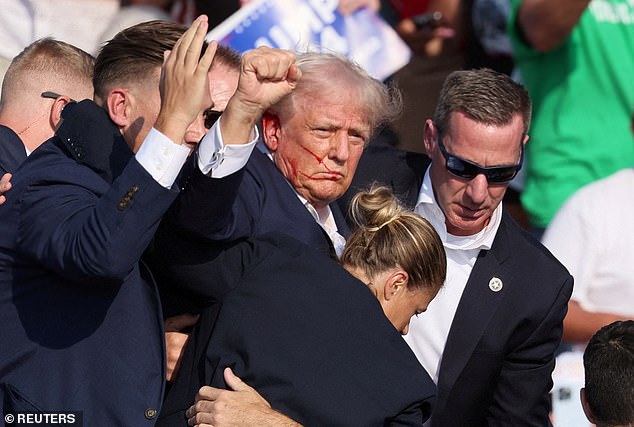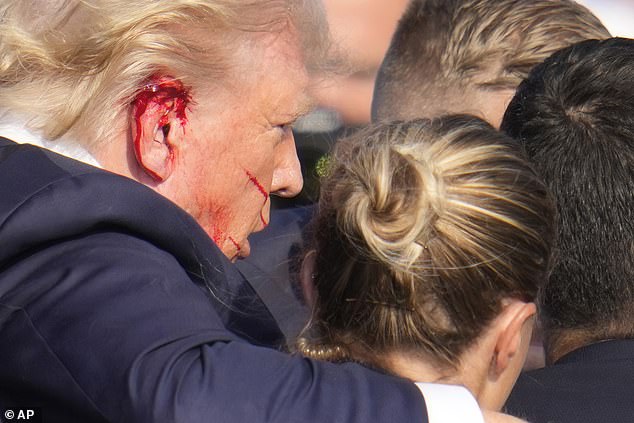Plastic surgeon reveals Donald Trump should undergo $10,000 surgery to repair bullet-damaged ear
Former President Donald Trump may have to take a break from campaigning for a while if he ever wants his profile to look the same again.
An assassination attempt on the Republican presidential candidate last weekend left him missing part of his right ear when he was shot during a rally in Pennsylvania.
Now, a plastic surgeon has announced that Trump will undergo a $10,000 operation to repair his shattered ear, which was covered in bandages when he appeared at the Republican National Convention on Monday.
Trump admitted that he lost part of the upper third of his ear in the shooting, as the bullet “pierced” the ear and “tore through his skin.”
According to Dr. Dennis Dass, a board-certified plastic surgeon in Beverly Hills, California, who has repaired hundreds of damaged ears, repairing them can be “complex,” depending on the extent of the damage.
The above image shows the surgical procedure Trump may undergo to repair his damaged ear. He is pictured here at the Republican National Convention

Donald Trump said he lost part of the top third of his right ear in the attempted assassination in Pennsylvania
Dr Dass told DailyMail.com: ‘Ear reconstruction is usually a complex procedure depending on the size and location of the defect.
“But the upper third of the ear is actually one of the easier areas to reconstruct.”
Immediately after the attack, Trump’s ear was wrapped in bandages to stop the “intermittent” bleeding, which is expected to last for a few days.
Doctors said he may also have been given antiseptics and stitches to treat the injured ear.
If Trump were to opt for an ear correction after his initial procedure, Dr. Dass said he would likely have to undergo reconstructive surgery called a helical advancement flap. This surgery can cost up to $10,000 and takes one to two hours.
In this procedure, if the missing part of the ear cannot be reattached, the surgeon first removes the damaged part of the ear and the scar tissue.
To close the wound, they make an incision along the inner rim of the ear, loosening the skin.
This allows them to ‘rotate’ nearby healthy tissue (cartilage and skin) over the injured area to restore the ear’s normal shape and improve its appearance.
Stitches are placed to hold the tissue in place for about a week. Within six weeks, the patient’s ear is fully healed.

Trump is pictured above with a bloody ear after the shooting. He has since appeared with his ear wrapped in a bandage
The healing process should not affect the campaign.
According to Dr. Dass, the surgery may leave a “little bit of damage,” but it will be minimal compared to the damage initially visible on the ear.
Normally the operation is performed under local anesthesia. The patient is still awake and the skin around the ear is numbed.
Trump’s camp has not disclosed whether the former president plans to undergo surgery on his ear.
Dr. Dass, who is own clinicadded: ‘I hope for his sake that it is a relatively minor injury and that the reconstruction can be quite simple.
“It was a very unfortunate situation he found himself in, it was absolutely horrible.
“I wish President Trump the very best and hopefully we can get a nice cosmetic result for his ear.”
According to Dr. Dass, the former president may need more extensive surgery if the damage is more extensive.
This may involve wedge closure surgery, where a triangle is cut out of the ear, including the damaged area, before being sutured.
He could also undergo local skin flap surgery, where the skin around the ear is loosened and then moved to cover the damaged area.
The damage to the outside of Trump’s ear was not thought to affect his hearing, although the bullet whizzing past it could.
Trump has not indicated whether he has suffered hearing loss.
Dr. Dass has never treated patients with a bullet wound to the ear before. He says most patients also have a gunshot wound to the head.
He has previously performed ear reconstruction following cancer treatment, where a cancerous area was cut out of the ear, and injuries from piercing extraction.
